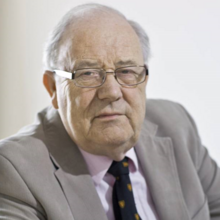David Hartley (computer scientist)
| Dr David Hartley | |
|---|---|
 |
|
| Born |
14 September 1937 Halifax, Yorkshire, England |
| Nationality | British |
| Fields | Computer science |
| Institutions |
University of Cambridge Computing Service Computer Laboratory United Kingdom Educational and Research Association (now JANET) Cambridge Crystallographic Data Centre (CCDC) Clare College, Cambridge The National Museum of Computing (TNMoC) British Computer Society Computer Conservation Society |
| Alma mater | Clare College, Cambridge |
| Thesis | Automatic Programming for Digital Computers (1963) |
| Doctoral advisor | Maurice Wilkes |
| Known for |
EDSAC 2 CPL Titan Multiple Access System Director of University of Cambridge Computing Service (23 years) UK Government Committees (inc. advisor to Prime Minister) Granta Backbone Network Establishment of the United Kingdom Education and Research Networking Association (UKERNA) President, British Computer Society (1999) Chairman, Computer Conservation Society (2007) EDSAC Replica Project |
David Fielding Hartley FBCS (born 14 September 1937) is a computer scientist and Fellow of Clare College, Cambridge. He was Director of the University of Cambridge Computing Service from 1970–1994, Chief Executive of United Kingdom Joint Academic Network (JANET) 1994–1997, and Executive Director of Cambridge Crystallographic Data Centre (CCDC) 1997–2002. He is now much involved with the National Museum of Computing.
He was involved in the development of the programming language CPL, whose influence can be traced on to C, and C++. He was president of the British Computer Society from 1999 to 2000 and chairman of the Computer Conservation Society from 2007 to 2011.
Dr. Hartley became an undergraduate at Clare College, University of Cambridge in 1956. He read Mathematics for the first two years and studied Numerical Analysis and Automatic Computing in his third year, graduating BA in 1959. He then became a research student of Computer science developing the first programming language "", and its compiler for the EDSAC 2 computer, for which he was awarded a PhD in 1963. His thesis was entitled "Automatic Programming for Digital Computers".
As a member of the staff of the university's Mathematical Laboratory he was joint author, with David Barron, John Buxton, Eric Nixon, and Christopher Strachey, of the early high-level programming language CPL. which was subsequently developed into BCPL which in turn influenced B and C.
...
Wikipedia
